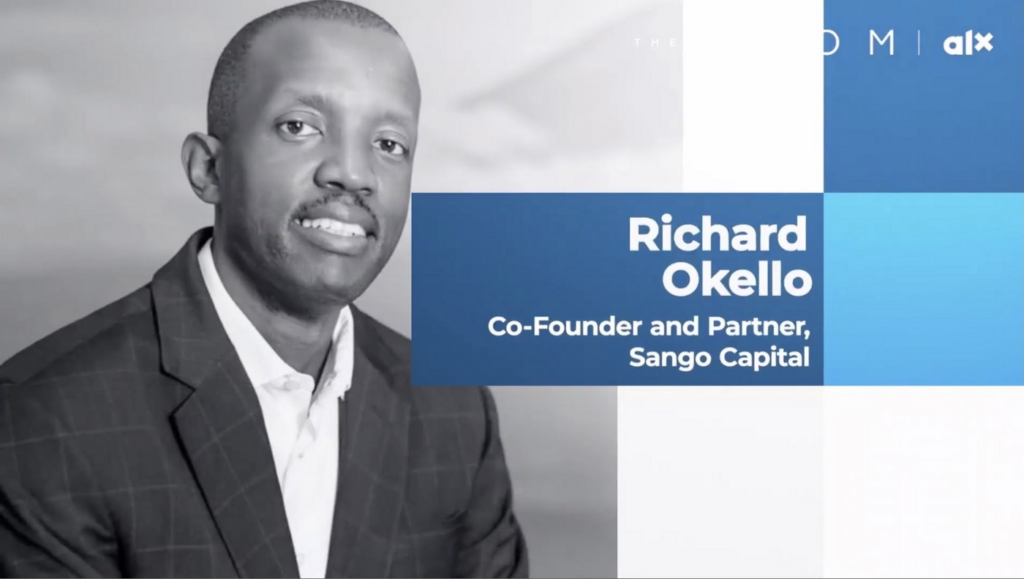Expect to Fail — And Don’t Get Hung Up On It
- 07 Feb 2023
- 10 min read
Richard Okello is the co-founder and CEO of Sango Capital, an innovative African private equity & tech-enabled growth/venture capital business backed by leading global investors. He holds Honours Degrees from both Pace University (MBA) and Swarthmore (BA), graduating a year early from the latter. He has previously served in various roles at Bridgewater Associates, including as a Partner and at Makena Capital based in Silicon Valley, where he was a Principal. Richard sits on several African fund advisory boards and African corporate boards, as well as the boards of Human Horizons USA and the African Leadership Foundation.
He spoke with us at the 2022 Doha Forum, opening up about some of the lessons he’s learned as an entrepreneur, his thoughts on the Fourth Industrial Revolution in Africa, and the critical importance of getting comfortable with failure.

Tell us about your journey as an entrepreneur and some of the lessons you’ve learnt along the way.
In my second startup (managed during the school holidays) I used to buy grains in an area that was not a hundred percent safe. This was when Uganda still had the civil war going on. There were no cell phones back then, so we had to use landlines. There was no access to information as you have now on smartphones. The farmers didn’t know what the regional or national pricing for their product was, so there were a lot of unknowns, and in a sense, that’s the nature of the entrepreneurial journey.
What I took out of that experience was that you have to expect that there will be mistakes and some failures. That’s just part of the journey. If you expect that you are going to go through those things, you’re better off than if you don’t expect it.
As I’ve done more entrepreneurial things over time, a key lesson I’ve learnt is that you have to have a humble view of yourself and what you’re trying to do. I think the mistake a lot of people make is thinking more of themselves than they ought to. If you do that, then when you fail, you will obviously doubt whether you should be doing this entrepreneurship thing or whether there’s something wrong with you. But if you approach things with the understanding that you’re part of a big picture that’s as important, if not more important than you, and endeavour to play as good a role as you can in that big picture, it makes for a different orientation towards entrepreneurship.

There are people who are cut out to be entrepreneurs, and tons of others who aren’t. It’s important to know that upfront so you can avoid wasting years finding that out through experience.
I’ve also found that it helps to be anchored in something that is 100% reliable. People anchor themselves in different ways. Some people anchor themselves in themselves, others in friends or money. I’m anchored in my faith in God. That’s helped me to see myself as someone who has something to bring to the world and to try to leave it better than I found it. That’s easier said than done, but that mindset has gotten me through the tough times. When I fail, I remind myself that I still need to do the thing I was purposely created to do here on earth, so I have to figure out another way to accomplish that mission.
Apart from that, my experience has shown me that it’s very important to know yourself and what you ought to be doing. There are people who are cut out to be entrepreneurs, and tons of others who aren’t. It’s important to know that upfront so you can avoid wasting years finding that out through experience.
What does it mean to you to be a truly impactful leader?
To be impactful, by definition, means you affect people — positively or negatively. That understanding gives you the option to make a positive impact. As a leader, once you decide that you want to leave the world better than you found it — to have a positive impact on people — that requires you to attach a value to those people.

If you want to lead, you have to define your impact through your contribution and effort. You also have to value the contribution and effort of the people you are leading.
There are some people who produce a lot of impact that’s detached from the people they seek to impact. That’s fine, but in my mind that’s not the most optimal way to impact people. If you want to lead, you have to define your impact through your contribution and effort. You also have to value the contribution and effort of the people you are leading. You need to have the ability to value people in some way and see what they bring to the table that you don’t necessarily have; that’s a critical part of leadership.
Also, you have to be willing to learn and you have to be willing to fail. It’s just the human condition — to literally be willing to fail and try again. And then lastly, you must be willing to work very hard to deserve a leadership spot.
How important is it to you to create opportunities for the next generation?
It’s very important. When I first left Uganda, I got a scholarship along with one other person; there were only two available. And I always thought to myself that there’s probably someone else in the country who, for whatever reason, didn’t get the scholarship, but could have done some amazing things through this opportunity — create jobs, lead the country, change lives etc. If you think of the scholarships as an investment the country made, then an important part of producing a return on the investment is creating opportunities for other people.

Since Sango Capital started investing, our companies have created more than 35,000 new, permanent, full-time jobs.
When I left my previous job to start this business and return to Africa, a critical motivation for taking that decision was not just to generate a return for investors, which is very important, but to do it in a way that creates meaningful economic opportunities for people. Since Sango Capital started investing, our companies have created more than 35,000 new, permanent, full-time jobs. In 2020, for example, our portfolio companies paid a quarter of a billion dollars in taxes to African governments. Those sound like big numbers until you look at the number of African businesses that need billions of disciplined capital to fund their profitable growth, the number of people that are being born in Africa daily and the number of young people in the workforce that need jobs. So we have our work cut out for us.
It is very important to me that what we are doing creates meaningful economic opportunities. When the people affected by these companies have and take pride in those opportunities, they can go home, look their kids in the eyes and tell them, “This is what I did today.” It makes a huge difference — it affects families, society and stability and allows them to give back to the community. If you can have this type of impact as an entrepreneur, then you will start to create the type of effect that extends beyond your capacity or your time on earth. Importantly, we are doing this as stewards of institutional capital who strive to generate top notch commercial returns. In the last two years, a number of these same portfolio companies have delivered high single digit and double-digit multiples of return on investment for our investors.
What excites you about the possibilities of the Fourth Industrial Revolution in Africa? Could the post-Covid disruption transform the continent into a global powerhouse?
It certainly has the potential to, and my context on that topic is the cellphone. When you have a lot of things that don’t work like they should, you need to be able to leapfrog them. Sometimes it’s too hard to work through every single problem to get to the solution in the traditional format. The introduction of cellphones in Africa was exactly that — it created a leapfrog around communication and information access. It gave people ownership over the information they could access, which then put the responsibility for problem solving and income generation on them.
The types of things we see people experiencing in their twenties and thirties are things that I could not have imagined that I would see — nevermind do — and that’s leapfrogging.
When I grew up in Uganda, people generally went to school and expected the government to provide a job afterwards. Once you had a cellphone, that responsibility shifted to you. The thinking was, “You have the information. You’re educated. Go make it happen.” So when I think about the Fourth Industrial Revolution, in my mind, the real opportunity lies in how it could help Africans leapfrog existing problems and create real value for themselves and in the world.
Will this revolution happen as quickly or as equally or even at all in all 54 African countries? I don’t know. For certain countries, I think it’ll take much longer than it needs to. For others, it will be much faster than people expect. In our venture business, the types of things we see people doing in their twenties and thirties are things that I could not have imagined that I would see — never mind do — and that’s leapfrogging. Whether it’s new tech-enabled businesses that create enormous economic value, employ hundreds of people or solutions that provide services for previously ignored consumers in just about every sector, or deep-tech solutions that increasingly affect not just African but global problems, it’s the leapfrogging effect that is most exciting about the Fourth Industrial Revolution.
What would you say to young leaders who are starting out in their entrepreneurial journey?

Failures are the difficult things; they’re not the impossible things, and making that mental switch makes the difference between abandoning something or not.
What you’re trying to do is bigger than yourself; you just need to recognise that. Expect to fail and don’t get hung up over it. A phrase that has been very instructive in my life is, “The difficult things get done now. The impossible things take a little while longer.” Obviously, this is easy to say and harder to do. But if you teach yourself to think that way, then the failures are the difficult things; they’re not the impossible things, and making that mental switch makes the difference between abandoning something or not. If you remind yourself that you haven’t gotten to the impossible thing yet and are just walking through the difficult things — which are failures — then the chances that you get to do the amazing, impossible things are much higher.
The last thing I’ll add is something I touched on earlier — be anchored in something. If the entrepreneurial journey were easy, the world would be packed with entrepreneurs. There’s a reason why that’s not the case, and there’s a reason why entrepreneurs who are even mildly successful are highly respected. Be anchored in something, so when the shaking comes, your feet will be firmly planted and you can keep progressing.
ALX is proud to be creating the next generation of entrepreneurial digital leaders in Africa. Find out more about its cutting-edge tech training programmes here.
 Ghana
Ghana  Ethiopia
Ethiopia  Egypt
Egypt  Morocco
Morocco  South Africa
South Africa  Rwanda
Rwanda  Nigeria
Nigeria  Kenya
Kenya 